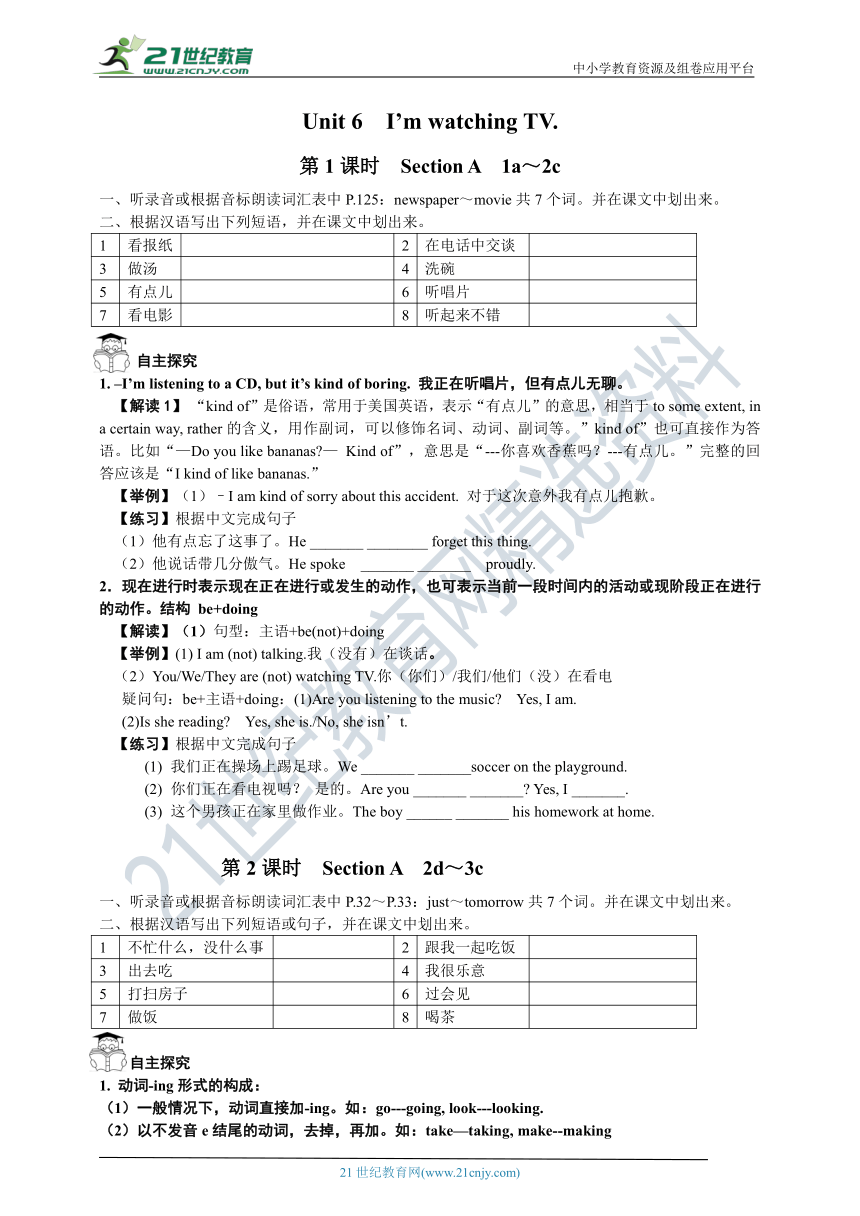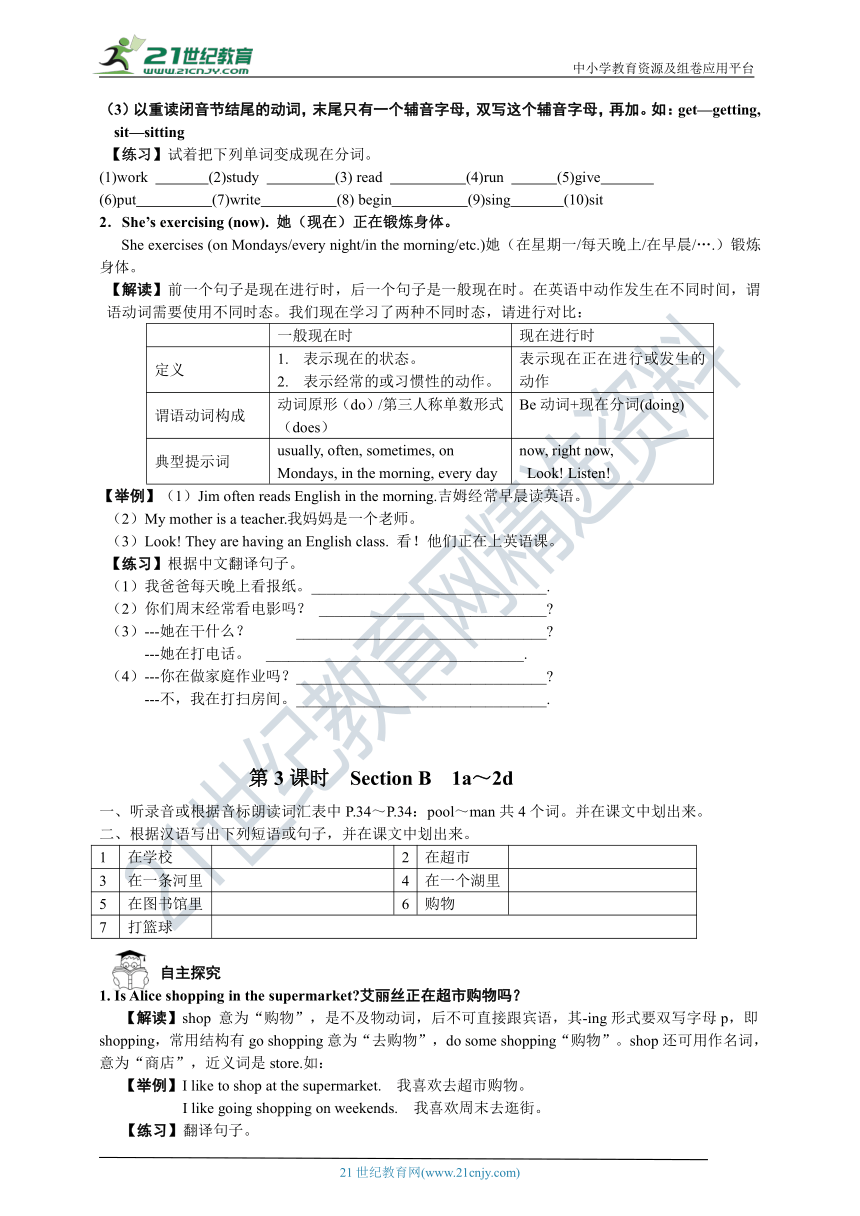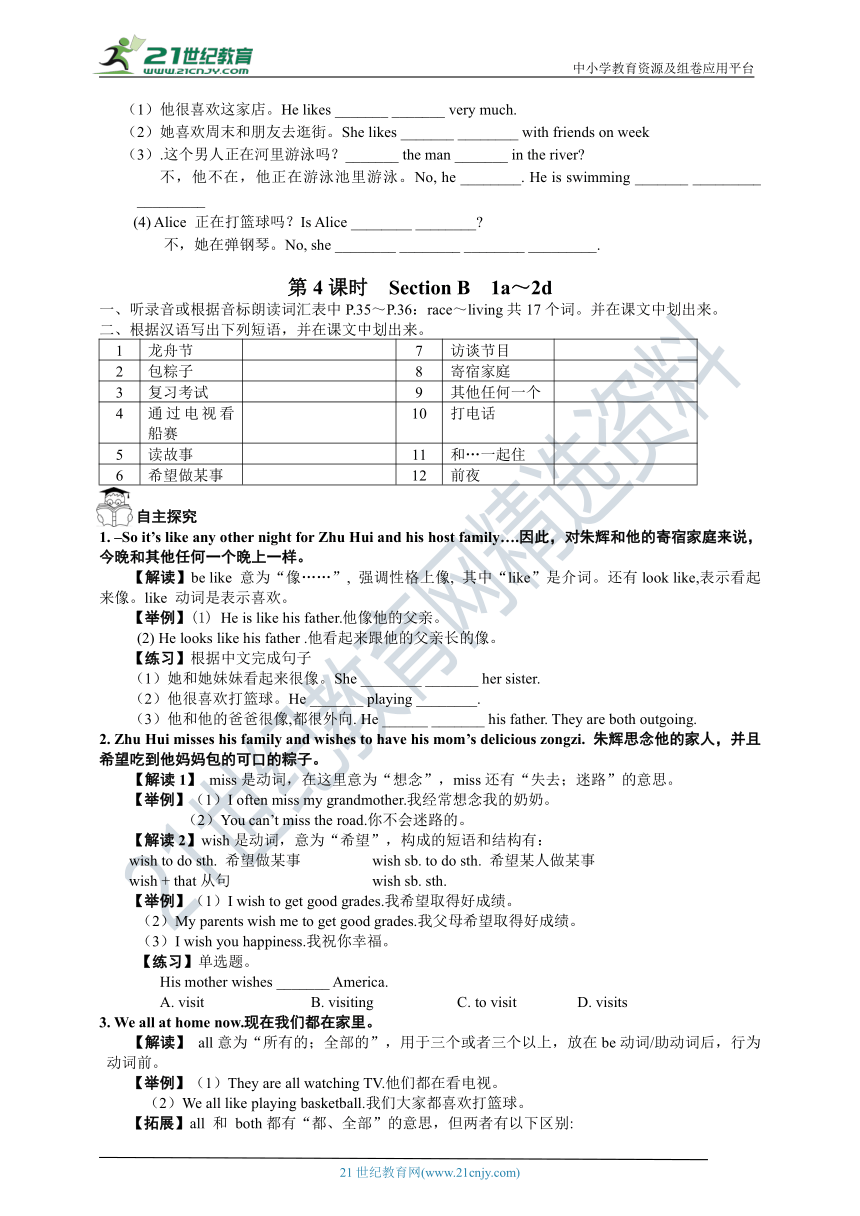Unit 6 I’m watching TV 单元同步学案(4课时 含答案)
文档属性
| 名称 | Unit 6 I’m watching TV 单元同步学案(4课时 含答案) |  | |
| 格式 | zip | ||
| 文件大小 | 1.2MB | ||
| 资源类型 | 试卷 | ||
| 版本资源 | 人教新目标(Go for it)版 | ||
| 科目 | 英语 | ||
| 更新时间 | 2020-08-17 22:00:57 | ||
图片预览



文档简介
中小学教育资源及组卷应用平台
Unit
6
I’m
watching
TV.
第1课时
Section
A
1a~2c
一、听录音或根据音标朗读词汇表中P.125:newspaper~movie共7个词。并在课文中划出来。
二、根据汉语写出下列短语,并在课文中划出来。
1
看报纸
2
在电话中交谈
3
做汤
4
洗碗
5
有点儿
6
听唱片
7
看电影
8
听起来不错
自主探究
1.
–I’m
listening
to
a
CD,
but
it’s
kind
of
boring.
我正在听唱片,但有点儿无聊。
【解读1】
“kind
of”是俗语,常用于美国英语,表示“有点儿”的意思,相当于to
some
extent,
in
a
certain
way,
rather的含义,用作副词,可以修饰名词、动词、副词等。”kind
of”也可直接作为答语。比如“—Do
you
like
bananas?—
Kind
of”,意思是“---你喜欢香蕉吗?---有点儿。”完整的回答应该是“I
kind
of
like
bananas.”
【举例】(1)–I
am
kind
of
sorry
about
this
accident.
对于这次意外我有点儿抱歉。
【练习】根据中文完成句子
(1)他有点忘了这事了。He
_______
________
forget
this
thing.
(2)他说话带几分傲气。He
spoke
_______
_______
proudly.
2.现在进行时表示现在正在进行或发生的动作,也可表示当前一段时间内的活动或现阶段正在进行的动作。结构
be+doing
【解读】(1)句型:主语+be(not)+doing
【举例】(1)
I
am
(not)
talking.我(没有)在谈话。
(2)You/We/They
are
(not)
watching
TV.你(你们)/我们/他们(没)在看电
疑问句:be+主语+doing:(1)Are
you
listening
to
the
music?
Yes,
I
am.
(2)Is
she
reading?
Yes,
she
is./No,
she
isn’t.
【练习】根据中文完成句子
(1)
我们正在操场上踢足球。We
_______
_______soccer
on
the
playground.
(2)
你们正在看电视吗?
是的。Are
you
_______
_______?
Yes,
I
_______.
(3)
这个男孩正在家里做作业。The
boy
______
_______
his
homework
at
home.
第2课时
Section
A
2d~3c
一、听录音或根据音标朗读词汇表中P.32~P.33:just~tomorrow共7个词。并在课文中划出来。
二、根据汉语写出下列短语或句子,并在课文中划出来。
1
不忙什么,没什么事
2
跟我一起吃饭
3
出去吃
4
我很乐意
5
打扫房子
6
过会见
7
做饭
8
喝茶
自主探究
1.
动词-ing形式的构成:
(1)一般情况下,动词直接加-ing。如:go---going,
look---looking.
(2)以不发音e结尾的动词,去掉,再加。如:take—taking,
make--making
(3)以重读闭音节结尾的动词,末尾只有一个辅音字母,双写这个辅音字母,再加。如:get—getting,
sit—sitting
【练习】试着把下列单词变成现在分词。
(1)work
(2)study
(3)
read
(4)run
(5)give
(6)put
(7)write
(8)
begin
(9)sing
(10)sit
2.She’s
exercising
(now).
她(现在)正在锻炼身体。
She
exercises
(on
Mondays/every
night/in
the
morning/etc.)她(在星期一/每天晚上/在早晨/….)锻炼身体。
【解读】前一个句子是现在进行时,后一个句子是一般现在时。在英语中动作发生在不同时间,谓语动词需要使用不同时态。我们现在学习了两种不同时态,请进行对比:
一般现在时
现在进行时
定义
表示现在的状态。表示经常的或习惯性的动作。
表示现在正在进行或发生的动作
谓语动词构成
动词原形(do)/第三人称单数形式(does)
Be动词+现在分词(doing)
典型提示词
usually,
often,
sometimes,
on
Mondays,
in
the
morning,
every
day
now,
right
now,
Look!
Listen!
【举例】(1)Jim
often
reads
English
in
the
morning.吉姆经常早晨读英语。
(2)My
mother
is
a
teacher.我妈妈是一个老师。
(3)Look!
They
are
having
an
English
class.
看!他们正在上英语课。
【练习】根据中文翻译句子。
(1)我爸爸每天晚上看报纸。_______________________________.
(2)你们周末经常看电影吗?
______________________________?
(3)---她在干什么?
_________________________________?
---她在打电话。
__________________________________.
(4)---你在做家庭作业吗?_________________________________?
---不,我在打扫房间。_________________________________.
第3课时
Section
B
1a~2d
一、听录音或根据音标朗读词汇表中P.34~P.34:pool~man共4个词。并在课文中划出来。
二、根据汉语写出下列短语或句子,并在课文中划出来。
1
在学校
2
在超市
3
在一条河里
4
在一个湖里
5
在图书馆里
6
购物
7
打篮球
自主探究
1.
Is
Alice
shopping
in
the
supermarket?艾丽丝正在超市购物吗?
【解读】shop
意为“购物”,是不及物动词,后不可直接跟宾语,其-ing形式要双写字母p,即shopping,常用结构有go
shopping意为“去购物”,do
some
shopping“购物”。shop还可用作名词,意为“商店”,近义词是store.如:
【举例】I
like
to
shop
at
the
supermarket.
我喜欢去超市购物。
I
like
going
shopping
on
weekends.
我喜欢周末去逛街。
【练习】翻译句子。
(1)他很喜欢这家店。He
likes
_______
_______
very
much.
(2)她喜欢周末和朋友去逛街。She
likes
_______
________
with
friends
on
week
(3).这个男人正在河里游泳吗?_______
the
man
_______
in
the
river?
不,他不在,他正在游泳池里游泳。No,
he
________.
He
is
swimming
_______
_________
_________
(4)
Alice
正在打篮球吗?Is
Alice
________
________?
不,她在弹钢琴。No,
she
________
________
________
_________.
第4课时
Section
B
1a~2d
一、听录音或根据音标朗读词汇表中P.35~P.36:race~living共17个词。并在课文中划出来。
二、根据汉语写出下列短语,并在课文中划出来。
1
龙舟节
7
访谈节目
2
包粽子
8
寄宿家庭
3
复习考试
9
其他任何一个
4
通过电视看船赛
10
打电话
5
读故事
11
和…一起住
6
希望做某事
12
前夜
自主探究
1.
–So
it’s
like
any
other
night
for
Zhu
Hui
and
his
host
family….因此,对朱辉和他的寄宿家庭来说,今晚和其他任何一个晚上一样。
【解读】be
like
意为“像……”,
强调性格上像,
其中“like”是介词。还有look
like,表示看起来像。like
动词是表示喜欢。
【举例】(1)
He
is
like
his
father.他像他的父亲。
(2)
He
looks
like
his
father
.他看起来跟他的父亲长的像。
【练习】根据中文完成句子
(1)她和她妹妹看起来很像。She
________
_______
her
sister.
(2)他很喜欢打篮球。He
_______
playing
________.
(3)他和他的爸爸很像,都很外向.
He
______
_______
his
father.
They
are
both
outgoing.
2.
Zhu
Hui
misses
his
family
and
wishes
to
have
his
mom’s
delicious
zongzi.
朱辉思念他的家人,并且希望吃到他妈妈包的可口的粽子。
【解读1】
miss是动词,在这里意为“想念”,miss还有“失去;迷路”的意思。
【举例】(1)I
often
miss
my
grandmother.我经常想念我的奶奶。
(2)You
can’t
miss
the
road.你不会迷路的。
【解读2】wish是动词,意为“希望”,构成的短语和结构有:
wish
to
do
sth.
希望做某事
wish
sb.
to
do
sth.
希望某人做某事
wish
+
that从句
wish
sb.
sth.
【举例】(1)I
wish
to
get
good
grades.我希望取得好成绩。
(2)My
parents
wish
me
to
get
good
grades.我父母希望取得好成绩。
(3)I
wish
you
happiness.我祝你幸福。
【练习】单选题。
His
mother
wishes
_______
America.
A.
visit
B.
visiting
C.
to
visit
D.
visits
3.
We
all
at
home
now.现在我们都在家里。
【解读】
all意为“所有的;全部的”,用于三个或者三个以上,放在be动词/助动词后,行为动词前。
【举例】(1)They
are
all
watching
TV.他们都在看电视。
(2)We
all
like
playing
basketball.我们大家都喜欢打篮球。
【拓展】all
和
both都有“都、全部”的意思,但两者有以下区别:
(1)
both指两个人或物,而all指三个以上的人或物,在句中都可作主语、宾语、表语、同位语
(?http:?/??/?zhidao.baidu.com?/?search?word=%E5%90%8C%E4%BD%8D%E8%AF%AD&fr=qb_search_exp&ie=utf8"
\t
"_blank?)或定语。
eg.
Both
of
us
want
to
go.
我们两人都想去。
All
of
us
should
work
hard.我们都应努力工作。
(2)
both和all都可直接修饰名词;名词前如有限定词
(?http:?/??/?zhidao.baidu.com?/?search?word=%E9%99%90%E5%AE%9A%E8%AF%8D&fr=qb_search_exp&ie=utf8"
\t
"_blank?)时,其前只能用both
of或all
of。
eg.
Both
brothers
are
clever.
兄弟俩都聪明。
Both
of
the
books
are
useful.两本书都有用。
(3)
both和all在句中的位置是位于be动词
(?http:?/??/?zhidao.baidu.com?/?search?word=be%E5%8A%A8%E8%AF%8D&fr=qb_search_exp&ie=utf8"
\t
"_blank?)之后,行为动词
(?http:?/??/?zhidao.baidu.com?/?search?word=%E8%A1%8C%E4%B8%BA%E5%8A%A8%E8%AF%8D&fr=qb_search_exp&ie=utf8"
\t
"_blank?)之前,如有情态动词
(?http:?/??/?zhidao.baidu.com?/?search?word=%E6%83%85%E6%80%81%E5%8A%A8%E8%AF%8D&fr=qb_search_exp&ie=utf8"
\t
"_blank?)或助动词
(?http:?/??/?zhidao.baidu.com?/?search?word=%E5%8A%A9%E5%8A%A8%E8%AF%8D&fr=qb_search_exp&ie=utf8"
\t
"_blank?),则位于情态动词
(?http:?/??/?zhidao.baidu.com?/?search?word=%E6%83%85%E6%80%81%E5%8A%A8%E8%AF%8D&fr=qb_search_exp&ie=utf8"
\t
"_blank?)或助动词
(?http:?/??/?zhidao.baidu.com?/?search?word=%E5%8A%A9%E5%8A%A8%E8%AF%8D&fr=qb_search_exp&ie=utf8"
\t
"_blank?)与主动词之间。
eg.
We
are
all
here.
我们都来了。
【练习】用both和all填空
(1)_______of
his
fingers
were
hurt.
??(2)_______of
his
shoes
are
dirty.
(3)His
parents
_______
like
shopping.?
(4)The
twins
are
_______
girls.
(5)His
father
has
three
brothers,
________
are
here
now.
参考答案:
Unit
6
I’m
watching
TV.
第1课时
Section
A
1a~2c
二、短语理解
1.
read
newspapers
2.
talk
on
the
phone
3.
make
soup
4.
wash
dishes
5.
kind
of
6.
listen
to
a
CD
7.
go
to
the
movies
8.
sounds
good
自主探究
1.
(1)
kind
of
(2)
kind
of
2.
(1)
are
playing
(2)
watching
TV
,
am
(3)
is
doing
第2课时
Section
A
2d~3c
二、短语理解
1.
not
much
2.
join
me
for
dinner
3.
eat
out
4.
I’d
love
to.
5.
clean
the
house
6.
See
you
then.
7.
make
dinner
8.
drink
tea
自主探究
1.
(1)working
(2)studying
(3)
reading
(4)running
(5)giving
(6)putting
(7)writing
(8)
beginning
(9)singing
(10)sitting
2.
(1)
My
father
reads
a
newspaper
every
night.
(2)
Do
you
often
go
to
the
movies
on
weekends?
(3)
What
is
she
doing?
She
is
talking
on
the
phone.
(4)
Are
you
doing
your
homework?
No,
I’m
cleaning
the
house.
第3课时
Section
B
1a~1d
二、短语理解
1.at
school
2.in
the
supermarket
3.in
the
river
4.in
the
pool
5.in
the
library
6.go
shopping
7.play
basketball
自主探究
1.(1.this
shop
(2)
going
shopping
(3)Is,swimming,
isn’t
,
in
the
pool
(4)
playing
basketball,
is
playing
the
piano
第4课时
Section
B
2a~self
check
二.短语理解
1.
the
Dragon
Boat
Festival
2.make
zongzi
3.study
for
a
test
4.
watch
the
boat
races
on
TV
5.read
a
story
6.wish
to
do
sth
7.
talk
show
8.host
family
9.any
other
10
.make
a
telephone
11.
live
with
12.
the
night
before
自主探究
1.(1)looks
like
(2)
likes,
basketball
(3)
is
like
2.
C
3.(1)All
(2)Both
(3)both
(4)both
(5)all
21世纪教育网
www.21cnjy.com
精品试卷·第
2
页
(共
2
页)
HYPERLINK
"http://21世纪教育网(www.21cnjy.com)
"
21世纪教育网(www.21cnjy.com)
Unit
6
I’m
watching
TV.
第1课时
Section
A
1a~2c
一、听录音或根据音标朗读词汇表中P.125:newspaper~movie共7个词。并在课文中划出来。
二、根据汉语写出下列短语,并在课文中划出来。
1
看报纸
2
在电话中交谈
3
做汤
4
洗碗
5
有点儿
6
听唱片
7
看电影
8
听起来不错
自主探究
1.
–I’m
listening
to
a
CD,
but
it’s
kind
of
boring.
我正在听唱片,但有点儿无聊。
【解读1】
“kind
of”是俗语,常用于美国英语,表示“有点儿”的意思,相当于to
some
extent,
in
a
certain
way,
rather的含义,用作副词,可以修饰名词、动词、副词等。”kind
of”也可直接作为答语。比如“—Do
you
like
bananas?—
Kind
of”,意思是“---你喜欢香蕉吗?---有点儿。”完整的回答应该是“I
kind
of
like
bananas.”
【举例】(1)–I
am
kind
of
sorry
about
this
accident.
对于这次意外我有点儿抱歉。
【练习】根据中文完成句子
(1)他有点忘了这事了。He
_______
________
forget
this
thing.
(2)他说话带几分傲气。He
spoke
_______
_______
proudly.
2.现在进行时表示现在正在进行或发生的动作,也可表示当前一段时间内的活动或现阶段正在进行的动作。结构
be+doing
【解读】(1)句型:主语+be(not)+doing
【举例】(1)
I
am
(not)
talking.我(没有)在谈话。
(2)You/We/They
are
(not)
watching
TV.你(你们)/我们/他们(没)在看电
疑问句:be+主语+doing:(1)Are
you
listening
to
the
music?
Yes,
I
am.
(2)Is
she
reading?
Yes,
she
is./No,
she
isn’t.
【练习】根据中文完成句子
(1)
我们正在操场上踢足球。We
_______
_______soccer
on
the
playground.
(2)
你们正在看电视吗?
是的。Are
you
_______
_______?
Yes,
I
_______.
(3)
这个男孩正在家里做作业。The
boy
______
_______
his
homework
at
home.
第2课时
Section
A
2d~3c
一、听录音或根据音标朗读词汇表中P.32~P.33:just~tomorrow共7个词。并在课文中划出来。
二、根据汉语写出下列短语或句子,并在课文中划出来。
1
不忙什么,没什么事
2
跟我一起吃饭
3
出去吃
4
我很乐意
5
打扫房子
6
过会见
7
做饭
8
喝茶
自主探究
1.
动词-ing形式的构成:
(1)一般情况下,动词直接加-ing。如:go---going,
look---looking.
(2)以不发音e结尾的动词,去掉,再加。如:take—taking,
make--making
(3)以重读闭音节结尾的动词,末尾只有一个辅音字母,双写这个辅音字母,再加。如:get—getting,
sit—sitting
【练习】试着把下列单词变成现在分词。
(1)work
(2)study
(3)
read
(4)run
(5)give
(6)put
(7)write
(8)
begin
(9)sing
(10)sit
2.She’s
exercising
(now).
她(现在)正在锻炼身体。
She
exercises
(on
Mondays/every
night/in
the
morning/etc.)她(在星期一/每天晚上/在早晨/….)锻炼身体。
【解读】前一个句子是现在进行时,后一个句子是一般现在时。在英语中动作发生在不同时间,谓语动词需要使用不同时态。我们现在学习了两种不同时态,请进行对比:
一般现在时
现在进行时
定义
表示现在的状态。表示经常的或习惯性的动作。
表示现在正在进行或发生的动作
谓语动词构成
动词原形(do)/第三人称单数形式(does)
Be动词+现在分词(doing)
典型提示词
usually,
often,
sometimes,
on
Mondays,
in
the
morning,
every
day
now,
right
now,
Look!
Listen!
【举例】(1)Jim
often
reads
English
in
the
morning.吉姆经常早晨读英语。
(2)My
mother
is
a
teacher.我妈妈是一个老师。
(3)Look!
They
are
having
an
English
class.
看!他们正在上英语课。
【练习】根据中文翻译句子。
(1)我爸爸每天晚上看报纸。_______________________________.
(2)你们周末经常看电影吗?
______________________________?
(3)---她在干什么?
_________________________________?
---她在打电话。
__________________________________.
(4)---你在做家庭作业吗?_________________________________?
---不,我在打扫房间。_________________________________.
第3课时
Section
B
1a~2d
一、听录音或根据音标朗读词汇表中P.34~P.34:pool~man共4个词。并在课文中划出来。
二、根据汉语写出下列短语或句子,并在课文中划出来。
1
在学校
2
在超市
3
在一条河里
4
在一个湖里
5
在图书馆里
6
购物
7
打篮球
自主探究
1.
Is
Alice
shopping
in
the
supermarket?艾丽丝正在超市购物吗?
【解读】shop
意为“购物”,是不及物动词,后不可直接跟宾语,其-ing形式要双写字母p,即shopping,常用结构有go
shopping意为“去购物”,do
some
shopping“购物”。shop还可用作名词,意为“商店”,近义词是store.如:
【举例】I
like
to
shop
at
the
supermarket.
我喜欢去超市购物。
I
like
going
shopping
on
weekends.
我喜欢周末去逛街。
【练习】翻译句子。
(1)他很喜欢这家店。He
likes
_______
_______
very
much.
(2)她喜欢周末和朋友去逛街。She
likes
_______
________
with
friends
on
week
(3).这个男人正在河里游泳吗?_______
the
man
_______
in
the
river?
不,他不在,他正在游泳池里游泳。No,
he
________.
He
is
swimming
_______
_________
_________
(4)
Alice
正在打篮球吗?Is
Alice
________
________?
不,她在弹钢琴。No,
she
________
________
________
_________.
第4课时
Section
B
1a~2d
一、听录音或根据音标朗读词汇表中P.35~P.36:race~living共17个词。并在课文中划出来。
二、根据汉语写出下列短语,并在课文中划出来。
1
龙舟节
7
访谈节目
2
包粽子
8
寄宿家庭
3
复习考试
9
其他任何一个
4
通过电视看船赛
10
打电话
5
读故事
11
和…一起住
6
希望做某事
12
前夜
自主探究
1.
–So
it’s
like
any
other
night
for
Zhu
Hui
and
his
host
family….因此,对朱辉和他的寄宿家庭来说,今晚和其他任何一个晚上一样。
【解读】be
like
意为“像……”,
强调性格上像,
其中“like”是介词。还有look
like,表示看起来像。like
动词是表示喜欢。
【举例】(1)
He
is
like
his
father.他像他的父亲。
(2)
He
looks
like
his
father
.他看起来跟他的父亲长的像。
【练习】根据中文完成句子
(1)她和她妹妹看起来很像。She
________
_______
her
sister.
(2)他很喜欢打篮球。He
_______
playing
________.
(3)他和他的爸爸很像,都很外向.
He
______
_______
his
father.
They
are
both
outgoing.
2.
Zhu
Hui
misses
his
family
and
wishes
to
have
his
mom’s
delicious
zongzi.
朱辉思念他的家人,并且希望吃到他妈妈包的可口的粽子。
【解读1】
miss是动词,在这里意为“想念”,miss还有“失去;迷路”的意思。
【举例】(1)I
often
miss
my
grandmother.我经常想念我的奶奶。
(2)You
can’t
miss
the
road.你不会迷路的。
【解读2】wish是动词,意为“希望”,构成的短语和结构有:
wish
to
do
sth.
希望做某事
wish
sb.
to
do
sth.
希望某人做某事
wish
+
that从句
wish
sb.
sth.
【举例】(1)I
wish
to
get
good
grades.我希望取得好成绩。
(2)My
parents
wish
me
to
get
good
grades.我父母希望取得好成绩。
(3)I
wish
you
happiness.我祝你幸福。
【练习】单选题。
His
mother
wishes
_______
America.
A.
visit
B.
visiting
C.
to
visit
D.
visits
3.
We
all
at
home
now.现在我们都在家里。
【解读】
all意为“所有的;全部的”,用于三个或者三个以上,放在be动词/助动词后,行为动词前。
【举例】(1)They
are
all
watching
TV.他们都在看电视。
(2)We
all
like
playing
basketball.我们大家都喜欢打篮球。
【拓展】all
和
both都有“都、全部”的意思,但两者有以下区别:
(1)
both指两个人或物,而all指三个以上的人或物,在句中都可作主语、宾语、表语、同位语
(?http:?/??/?zhidao.baidu.com?/?search?word=%E5%90%8C%E4%BD%8D%E8%AF%AD&fr=qb_search_exp&ie=utf8"
\t
"_blank?)或定语。
eg.
Both
of
us
want
to
go.
我们两人都想去。
All
of
us
should
work
hard.我们都应努力工作。
(2)
both和all都可直接修饰名词;名词前如有限定词
(?http:?/??/?zhidao.baidu.com?/?search?word=%E9%99%90%E5%AE%9A%E8%AF%8D&fr=qb_search_exp&ie=utf8"
\t
"_blank?)时,其前只能用both
of或all
of。
eg.
Both
brothers
are
clever.
兄弟俩都聪明。
Both
of
the
books
are
useful.两本书都有用。
(3)
both和all在句中的位置是位于be动词
(?http:?/??/?zhidao.baidu.com?/?search?word=be%E5%8A%A8%E8%AF%8D&fr=qb_search_exp&ie=utf8"
\t
"_blank?)之后,行为动词
(?http:?/??/?zhidao.baidu.com?/?search?word=%E8%A1%8C%E4%B8%BA%E5%8A%A8%E8%AF%8D&fr=qb_search_exp&ie=utf8"
\t
"_blank?)之前,如有情态动词
(?http:?/??/?zhidao.baidu.com?/?search?word=%E6%83%85%E6%80%81%E5%8A%A8%E8%AF%8D&fr=qb_search_exp&ie=utf8"
\t
"_blank?)或助动词
(?http:?/??/?zhidao.baidu.com?/?search?word=%E5%8A%A9%E5%8A%A8%E8%AF%8D&fr=qb_search_exp&ie=utf8"
\t
"_blank?),则位于情态动词
(?http:?/??/?zhidao.baidu.com?/?search?word=%E6%83%85%E6%80%81%E5%8A%A8%E8%AF%8D&fr=qb_search_exp&ie=utf8"
\t
"_blank?)或助动词
(?http:?/??/?zhidao.baidu.com?/?search?word=%E5%8A%A9%E5%8A%A8%E8%AF%8D&fr=qb_search_exp&ie=utf8"
\t
"_blank?)与主动词之间。
eg.
We
are
all
here.
我们都来了。
【练习】用both和all填空
(1)_______of
his
fingers
were
hurt.
??(2)_______of
his
shoes
are
dirty.
(3)His
parents
_______
like
shopping.?
(4)The
twins
are
_______
girls.
(5)His
father
has
three
brothers,
________
are
here
now.
参考答案:
Unit
6
I’m
watching
TV.
第1课时
Section
A
1a~2c
二、短语理解
1.
read
newspapers
2.
talk
on
the
phone
3.
make
soup
4.
wash
dishes
5.
kind
of
6.
listen
to
a
CD
7.
go
to
the
movies
8.
sounds
good
自主探究
1.
(1)
kind
of
(2)
kind
of
2.
(1)
are
playing
(2)
watching
TV
,
am
(3)
is
doing
第2课时
Section
A
2d~3c
二、短语理解
1.
not
much
2.
join
me
for
dinner
3.
eat
out
4.
I’d
love
to.
5.
clean
the
house
6.
See
you
then.
7.
make
dinner
8.
drink
tea
自主探究
1.
(1)working
(2)studying
(3)
reading
(4)running
(5)giving
(6)putting
(7)writing
(8)
beginning
(9)singing
(10)sitting
2.
(1)
My
father
reads
a
newspaper
every
night.
(2)
Do
you
often
go
to
the
movies
on
weekends?
(3)
What
is
she
doing?
She
is
talking
on
the
phone.
(4)
Are
you
doing
your
homework?
No,
I’m
cleaning
the
house.
第3课时
Section
B
1a~1d
二、短语理解
1.at
school
2.in
the
supermarket
3.in
the
river
4.in
the
pool
5.in
the
library
6.go
shopping
7.play
basketball
自主探究
1.(1.this
shop
(2)
going
shopping
(3)Is,swimming,
isn’t
,
in
the
pool
(4)
playing
basketball,
is
playing
the
piano
第4课时
Section
B
2a~self
check
二.短语理解
1.
the
Dragon
Boat
Festival
2.make
zongzi
3.study
for
a
test
4.
watch
the
boat
races
on
TV
5.read
a
story
6.wish
to
do
sth
7.
talk
show
8.host
family
9.any
other
10
.make
a
telephone
11.
live
with
12.
the
night
before
自主探究
1.(1)looks
like
(2)
likes,
basketball
(3)
is
like
2.
C
3.(1)All
(2)Both
(3)both
(4)both
(5)all
21世纪教育网
www.21cnjy.com
精品试卷·第
2
页
(共
2
页)
HYPERLINK
"http://21世纪教育网(www.21cnjy.com)
"
21世纪教育网(www.21cnjy.com)
同课章节目录
- Unit 1 Can you play the guitar?
- Section A
- Section B
- Unit 2 What time do you go to school?
- Section A
- Section B
- Unit 3 How do you get to school?
- Section A
- Section B
- Unit 4 Don't eat in class.
- Section A
- Section B
- Unit 5 Why do you like pandas?
- Section A
- Section B
- Unit 6 I'm watching TV.
- Section A
- Section B
- Review of Units 1-6
- Unit 7 It's raining!
- Section A
- Section B
- Unit 8 Is there a post office near here?
- Section A
- Section B
- Unit 9 What does he look like?
- Section A
- Section B
- Unit 10 I'd like some noodles.
- Section A
- Section B
- Unit 11 How was your school trip?
- Section A
- Section B
- Unit 12 What did you do last weekend?
- Section A
- Section B
